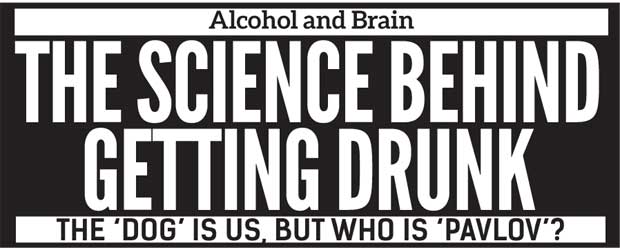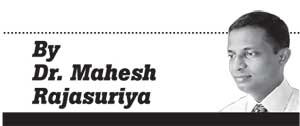29 Jan 2018 - {{hitsCtrl.values.hits}}

We all know that when people drink alcohol they behave in a certain way. Either we have seen this or have experienced it ourselves. Unfortunately, we hardly explore the science behind effects of alcohol. This is an opportune time to do this given the prevailing discourse on alcohol. I have written about the same topic many years ago, and today let us revisit and revise same.
They start to talk louder, excessively; act aggressively, jovially; and sing and dance, too. People who do not usually sing and dance will start to sing or dance. Inhibitions disappear. A liveliness and arousal emerge. One sees and hears the drinker being aroused by alcohol apparently. 
Swallowed alcohol goes to the brain, and it acts on neurons, which are the cells that make up the brain,to cause intoxication; apparently, a state of arousal as described above.
Well, you only need to read any book on neurobiology or do a quick search on the internet. Alcohol is a potent CNS depressant!
It’s the Central Nervous System: The brain and the spinal column
Well, we just concluded that alcohol apparently functions as a brain stimulant. But when we check the chemical properties of alcohol, we find out that it is a -
Brain depression would cause the person to talk slowly, walk slowly and feel depressed; but after drinking alcohol the person talks loudly, dances enthusiastically, and feels lively.
How can we explain the features of alcohol intoxication? Before answering this question, I like to post yet another question.
Sometimes people start showing the effects of alcohol intoxication as they start to plan an alcohol-consuming session. Many will show signs of stimulation while they open the bottle pour the liquid and start drinking. Most people will show signs of stimulation after they have had a few ‘shots’.
Alcohol is absorbed from our stomach and intestines and then passed through the liver. The liver then removes most of the Alcohol from the blood, a process that actually harms the liver. Liver cells quickly become damaged in the process. A few sips of alcohol would be sufficient enough to cause this damage. As the liver removes alcohol from the blood, it takes a while for alcohol concentration to build up in the blood. Obviously, you need to drink with reasonable interval so than the rate of the liver that does its faithful job. Therefore, it takes quite a while for enough alcohol to reach the brain. How can we explain the fact that certain people start showing signs of alcohol intoxication during the time that enough alcohol has not yet reached the brain? That is, when the first few sips are consumed? Difficult, right?
Furthermore, there is no way to explain the behaviour of people who start showing signs of alcoholic effects, even before the first drink!
We have now answered the question ‘How fast does alcohol reach the brain and produce intoxication?’
Hang on! we are left with a puzzle: Why do people develop effects of alcohol intoxication before alcohol actually reaches the brain in sufficient volume? Here goes another question we need to address, before answering any of these questions. ...can effects of alcohol intoxication be reversed? The obvious answer is, yes.
If the verbosity, aggression, frolicking and poor judgement were due to alcohol, why would they suddenly disappear? Surely, alcohol concentration in the blood cannot be fluctuating greatly and hurriedly in response to environmental cues!
Let us summarise all these unanswered questions mentioned above: Why do effects of alcohol seem to be readily reversible without change in blood alcohol concentration? How come alcohol appears to exert its effects on the brain very quickly (sometimes even before drinking has started) while it takes a while for the blood alcohol concentration to build up? How can we explain alcohol’s stimulating effects knowing that it is a powerful brain depressant?
There is only one answer to these three questions. But let us explore one more issue, ‘learning’, before we go further.
Learning is something we do all the time. Education involves complex learning. However,the psychological phenomenon called ‘learning’ is a term used with a particular meaning in Psychology and is considered a cornerstone of modern Psychology. One of the simplest forms of learning is ‘association’. This was beautifully demonstrated by Physiologist Ivan Pavlov, a Russian, over a century ago.
Pavlov fed dogs, his lab animals with meat powder. In one of his experiments, which he designed after an accidental finding, he fed them as a bell was rung. And he did this repeatedly. After a while, he rang the bell, but he had no meat powder. He saw the dogs starting to salivate as soon as they heard the bell ringing. Just imagine! A dog is salivating when a bell is rung?
As the ringing of a bell and salivation (originally due to the smell of meat powder) were coupled a few times, the dogs learnt to salivate at the clang of the bell.
This is learning of a new behaviour (salivating in response to a bell ringing) with association - bell and meat powder - which was not there before (dogs did not salivate in response to ringing of bell before this).
Not only new behaviours, new emotions, too, could be learnt.
We do not drink in isolation under despairing conditions, generally. At least not at the beginning of a person’s drinking career. We usually drink with friends and relatives during celebrations. Delicious food in a comfortable environment, friendly conversation, light humour and memories come to the surface. All these and more are shared.
After a while, alcohol alone brings us joy, pleasure, songs, and nice memories. We seem to have our brains stimulated.However, what we do not understand is that this apparent brain stimulation is the ‘salivation’ and alcohol is the ‘bell’! We really feel the fun and the joy as we become ‘intoxicated’ with alcohol.
We really behave as if we are stimulated and we really are the ‘dogs’ in the lab of Pavlov! Learning, which is even more complicated than the simple mechanism given above, is one powerful way to describe many effects (including sudden disappearance of such effects) of alcohol. That seems to be the conclusion. What an anti-climactic end to this discussion!
So we act the ‘Pavlovian Dog’, and we ‘salivate’ when the ‘bell’ is rung. The only difference is that the ‘bell’ is alcohol. The ‘salivation’ is the nonsense we do and feel.
The ‘dog’ means us; and ‘Pavlov’ is the alcohol industry!
28 Oct 2024 7 hours ago
28 Oct 2024 7 hours ago
28 Oct 2024 9 hours ago
28 Oct 2024 28 Oct 2024
28 Oct 2024 28 Oct 2024